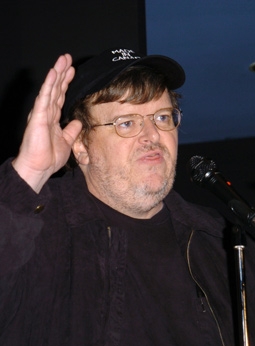
Filmmaker Michael Moore has a knack for making people mad. Some people get mad at him, while others get mad at the institution that has a harsh florescent spotlight shone upon it by Moore’s latest anti-establishment documentary. Alleged corrupt politicians and corporate monsters scurry in different directions towards the nearest dark hole until re-emerging into damage control mode, after the release of a Michael Moore film. The surge of bureaucratic panic that accompanied the release of both 2004’s Fahrenheit 911 and 2007’s SiCKO, is a testament to the scary thought that Moore is actually on to something. While it is no secret that the United States is sometimes plagued by the ills of its own hyper-capitalism at the expense of humanity, Moore has managed to drudge up enough factual and compelling evidence to make empathetic Americans ask the very same question he posed during his film SiCKO – “Who are we?” And come to think of it, why are we the only civilized, westernized society to not provide single payer Universal healthcare to each and every one of our citizens? Who are we, when we can spend twelve billion dollars a month on the war in Iraq, but cannot find it in our hearts to take care of one another here at home? Why does our capitalism have to lead us down a path of “me” as opposed to “we?”
If you follow the bouncing ball all the way back to the Washington playground from whence it sprung, and then over into our humble backyard, it is fundamentally true that this is not a healthcare crisis at all. The fact that fifty million Americans are uninsured and two hundred and fifty million Americans are victimized to varying degrees, by the health insurance system in America, is a crisis of greed; a crisis of political corruption. But most importantly, a crisis of Americans being led by a government that doesn’t represent many of our best interests or even our core values. Michael Moore told PR.com, “This has to change and I would hope that the next President would lead the charge. If not, congress has to do it.” Moore is referring to a political system that is currently in a chokehold by the lobbyists and special interest groups who continue to influence public policy. Moore insists, “That’s only going to come when the people demand it, when people voting show up at these candidates’ forums saying ‘I want lobbyist money out of politics now!”
Lobbyists and special interest groups have been allowed to run amuck in Washington D.C., dolling out hush money, swaying our congress, and lulling the rest of us into a deep slumber by hiding behind the very politicians whom we have given our trust to. When I posed this observation to Michael Moore, he went on to challenge, “We have to take the money out of our electoral system. We have to look at other western industrialized countries in terms of how they do it. They don’t allow this. They have very short campaign seasons where everybody gets equal time on television. Everyone is at the debate and then the people decide. They decide, often in a country like Canada, on a paper ballot with a number two pencil. Those ballots are visible and counted and there’s a party representative there watching how they count the ballots when the polls close. It’s a very honest system and people trust it.”
Michael Moore also feels that trust in this type of system brings out a larger voter turn out in these other countries, on election days. “Seventy, eighty, ninety percent [of the people] in these other countries are showing up to vote because they know their vote counts.” On the surface Moore’s comment is a jab at the much disputed 2000 Presidential election in the United States and a 2004 election that also raised many eyebrows as it pertained to the final count in the battleground state of Ohio. But at a deeper level, Moore finds fault with an American electoral system where he feels the popular vote takes a tragic backseat to the Electoral College, a system that thrives on bureaucracy and the corporate sponsoring of candidates. “First and foremost money has to be removed; lobbyists money. Right now there are four healthcare lobbyists for every member of Congress who are working full time. Just imagine,” Moore muses with a temperament that glides between amusement and disgust, “four full time lobbyists dedicated to one member of congress! And that’s their job.”
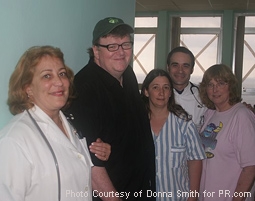
Michael Moore insists that we are all victims of a healthcare system that puts the bottom line before the health and welfare of human beings and that none of us are truly immune – the wealthy and upper middle class are trapped within the same broken system. They just have the means to better work within this broken system. The ones who really suffer are the working class and poor who cannot afford to stay two steps ahead with expensive PPOs that can cost close to one thousand dollars per month in premiums, and an income that allows the luxury of going “out of network” when need be. The wealthy let out a sigh of exasperation just like the poor and working class do, but they sigh all the way to their favorite specialist, whom they can pay from their own bulging wallet. But what happens to the majority of Americans who don’t earn six figure incomes and must rely on the mercy of their insurance company? They are, for all intents and purposes, relying on a system that is in the business of collecting money and keeping it. These are companies who would like nothing more then to bury their customers’ insurance claims at the bottom of a black hole. Talk about sleeping with the enemy!
In addition to speaking with Michael Moore, PR.com caught up with three patients who are documented in the film, SiCKO, to see where they are now and to hear their take on American healthcare and politics.
Those of you who saw the film, SiCKO, will remember Donna Smith and her husband Larry Smith as the couple who were forced to sell their home in South Dakota and move into their daughter’s storage room in Denver, Colorado after medical expenses forced the couple into bankruptcy. Larry Smith was diagnosed with chronic coronary disease, while Donna Smith was diagnosed with uterine cancer. They discovered that their health insurance, obtained through Donna’s then employer, was not the safety net they had believed it to be. As Donna explains, “Even though we were fully insured, and I’d always made it a priority to have insurance, our premiums kept going up while our coverage kept getting worse. There were higher deductibles, higher co-pays and out of pocket expenses that you’d need a law degree to understand.” The Smiths thought they could sleep soundly at night knowing they had PPO coverage from their local insurance company, DakotaCare. Though their monthly premium for coverage through DakotaCare was a hefty sum, the Smiths’ policy indicated that they must meet an exorbitant annual deductible before ever seeing a dime from the insurance company. According to Donna Smith, “They honored everything [in] our contract. We were never denied care. The problem for us was that the coverage had so many gaps in terms of deductibles and out of pocket expenses, that you were liable for up to nine thousand dollars in out of pocket expenses, even though you were paying a four hundred dollar a month premium.”
Donna Smith was lucky enough to be chosen (along with a handful of others) out of twenty-five thousand other disgruntled health insurance consumers who emailed Michael Moore. Smith was also one of the people in the film who took that notorious boat ride, first to Gaunatanamo Bay detention center (where detainees are known to receive free quality healthcare), and then on to Cuban soil to receive free healthcare and discounted medication through Cuba’s single payer Universal healthcare system.
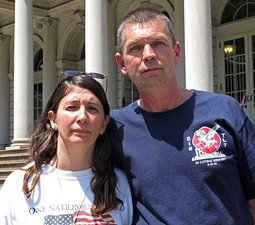
According to fellow SiCKO cast member and patient, William Maher, who Moore also took down to Cuba to seek medical care for his illnesses related to his volunteer work after 9/11, the Bush administration opened a criminal investigation into their trip and the investigation is still pending. Maher does not feel threatened by this investigation and chalks it up to little more than baseless intimidation. “I believe it’s a scare tactic. When they don’t like something, they try to scare you. When we came back from Cuba [the government] went to Michael Moore with a letter and they tried to get information from him. They asked, ‘Who are the parties involved? We want names.’ He wouldn’t give them up and apparently they investigated the travel agency that was involved. I think they were able to get the names through the travel agency. I never received anything official. They said they were going to try to develop a case against Michael Moore and the other people involved.”
Maher explained to me that the charges stemmed from the fact that “basically we traveled illegally.” He shrugs off the impending possible threat saying, “I just believe they love to keep hanging these things over your head, so they try to keep you paranoid. I can’t get hurt anymore then I am.” William Maher is keenly aware that although he struggles from day to day with various 9/11 related ailments, that he is fortunate to still be alive, pointing out that many other rescue workers who volunteered down at ground zero have since succumbed to their illnesses. “All in all, I’m still walking and I’m still talking. There are so many 9/11 responders who I know, that in the past year and a half, have passed away because of these illnesses. That’s why I have to continue my involvement.”
A 9/11 rescue worker who volunteered his time at nights and on weekends from December of 2001 through June of 2002, William Maher was left with chronic lung problems that restrict his breathing. Maher also suffered severe post traumatic stress syndrome as the result of his rescue work down at ground zero, began grinding his teeth at night and wearing them down to nubs. Though he currently participates in a program for 9/11 rescue workers through Mount Sinai Hospital, he still has trouble getting the quality of care he needs. When I probed Maher about special medical concessions, which I assumed were firmly in place for 9/11 rescue workers, he responded with a shockingly grim and little known piece of information regarding this particular healthcare issue. “Last year’s budget for the 9/11 responders, for their healthcare funding, has been slashed by 77%. That was President Bush’s final fiscal 2009 budget.” As part of a managed care network, or HMO, Maher was restricted as to when he could see a specialist and where he could go. “After I came back from Cuba, my doctor here in New Jersey recommended that I go see some specialists. He tried to hook me up with three different specialists and each specialist was out of network. So therefore, forget about it.” We continued to share a back and forth dialogue about the terrible injustice of insurance companies dictating which doctors are best for you, not based on who could offer the best treatment, but based solely on who is in their insurance company’s “network.”
When I asked William Maher if he was at all surprised at the lack of financial health related resources available to 9/11 rescue workers, he had this to say, “Was I surprised? No (laughs). In this country it’s all about class. If you can afford it, then you can get what you need. If you can’t, then you’re left to fend for yourself.”
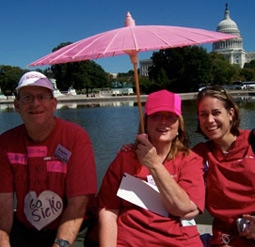
As for both Donna Smith and William Maher, they both expressed profound appreciation for the free healthcare they received in Cuba as part of Michael Moore’s documentary, SiCKO. Both Donna and William mention that many of the facts we thought we knew about socialized medicine may not be entirely correct. I recoil to think that the information we have been fed this whole time has been propaganda driven by our own government that wants us to feel warm and fuzzy about being the only westernized society who makes their citizens pay for healthcare.
When I questioned Maher about the wait time to be seen by a physician in Cuba, he had this to say, “After Michael Moore left and the film crew left, I was the last one there. They left me there for almost two weeks by myself because they were still working on my teeth and doing tests on my spine. So I got an interesting look that other members of the movie and the crew didn’t get to see. I saw people coming in who would sit for just a short amount of time. Patients would just give a few pieces of information and they would have the doctor check them right away.”
And when I asked Donna Smith about her feedback on the quality of the healthcare she received in the Cuban hospital, and if she found her doctors in Cuba to be less knowledgeable, she claimed that it was not at all the case. “It was just the opposite for me. I was very concerned about what level of care I might be able to get in Cuba. The difference for me was the integration of care they have there. Physicians are very hands on with patients, and it wasn’t just those of us who were there for the film. Doctors just spend a lot more time at the bedside. They’re not racing on to the next patient because they have one minute to spend before they have to make it over to the next person.”
Donna Smith noted a common complaint among patients in the United States who often complain that the health insurance companies have turned many physicians’ offices into sausage factories, where many doctors have a get’em in and get’em out philosophy to increase their profits. As Donna explains it, “I think the goal here in the United States is to see somebody, prescribe something and send them on. I also think there’s a huge barrier in this country for any doctor ever speaking up and saying that what another doctor has done might not be appropriate. They’re afraid the patient might jump to thinking they’re going to sue. Our whole system is so geared on the financial and what’s going to happen with the money angle on everything.”
Both Donna Smith and William Maher stress that in their personal experiences within a socialized healthcare environment, the doctor is one hundred percent present, and therefore able to focus on the patient’s needs more effectively. Explaining that over the years she had accumulated a daily regimen of nine prescription medications, the doctors in Cuba went through each medication individually. They took the time to weigh the pros and cons of each medication and how they interact with Donna’s various conditions. Donna Smith left Cuba with a streamlined and more healthful regimen of four prescription medications per day.
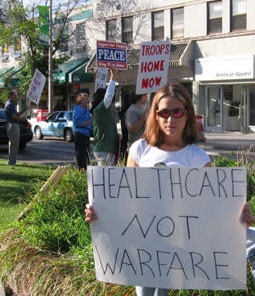
Adrian Campbell also appeared in the film SiCKO where we watched her tentatively cross the border from her home state of Michigan into Canada where there is also a single payer Universal healthcare system in place for its citizens. Adrian used a Canadian friend’s residential address to receive healthcare from a clinic in Toronto. Adrian was only twenty-two years old when she discovered that she had cervical cancer and would require a LEEP procedure to rid her cervix of the cancerous cells. Adrian was covered by Blue Cross Blue Shield at the time, which she got through General Motors. After receiving her operation, which ridded her body of the cancer, Adrian was shocked to receive a whopping medical bill in the mail. Her claim put in to Blue Cross Blue Shield for this necessary operation had been denied. According to Adrian, “I got a letter of denial from Blue Cross Blue Shield saying that they were not going to be paying that because the type of surgery I had is only recommended on women twenty-six years of age and older, and in the state of Michigan, to have this type of surgery done on your reproductive organs, you must be twenty-six years of age or older. I was twenty-two.”
Adrian Campbell continued to press her health insurance provider; she put calls in to her hospital and eventually resigned herself to paying the bill out of her own pocket. The grand total? “Close to seven thousand dollars for just the surgery alone.” Now Adrian has gotten wise to the system and makes trips up to Canada whenever need be to seek medical attention that might become too costly for her in the states. After appearing in the film SiCKO, Adrian alleges that she also faced some discrimination at work and was ultimately fired from her job. Still reeling from the events that transpired at her job when word spread of her appearance in SiCKO, Adrian recalls “I was fired. I hate to use that word because it just sounds so negative. I never mentioned the movie to anyone. No one knew. I was actually out on medical [leave] when it was released. I came back to work and word started getting out that I was in the film. My boss sat me down in his office and said, ‘Is this true?’ He started harassing me and he called me anti-American. I told my store director that he was making vague threats and saying that I should be fired.” Shortly after her scuffle with her employer, Adrian was let go due to “restructuring” within the company.
To the contrary, Donna Smith has received mainly positive feedback for her appearance in the film. She continues to travel to Universities and other venues where she speaks out on healthcare reform. Her passion and activism caught the attention of The California Nurses Association, where she was offered a communications position at their Chicago office. Donna and Larry Smith have moved out of their daughter’s storage room and are heading back to Donna’s hometown of Chicago, Illinois. “I’m going to actually get paid to work on national healthcare reform,” she exclaimed. Also reveling in the irony of her move, “I was born and raised in Chicago, even though I haven’t lived there for thirty years. So this is a homecoming of sorts.”
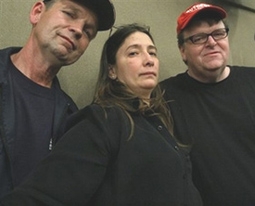
Smith then becomes reflective and laments the shameless discrimination tactics that health insurance companies are allowed to get away with when qualifying potential customers. Referring to her struggles to obtain decent health coverage since her cancer diagnosis, “Nobody wants to insure a cancer survivor. That’s not something [the insurance companies] want to take on.” When I mention that this issue reared its head in the February 21st Democratic debate, Smith is quick to jump in, “You could even argue that we do have laws in this country about discriminating against the disabled, and people who have certain disabling conditions are definitely being told they can’t have insurance. That doesn’t add up.”
When I question William Maher about his thoughts on Senator Barack Obama’s healthcare proposal of more affordable health insurance and Senator Hillary Clinton’s proposed mandate for paid Universal healthcare, William Maher is quick to retort, “It’s nonsense! No matter what, they’re going to still make you pay and if you don’t purchase healthcare, you’re going to be imposed with a penalty or fine. I don’t think we need to be socialists, but take care of your people, take care of your people.”
Donna Smith left me with these final thoughts, “For me it looks like it’s going to be a happy ending. Now I’ve got to help the nation and help my fellow citizens. We’ve got to fix this problem,” because she insists, “We’re better people than this.”
